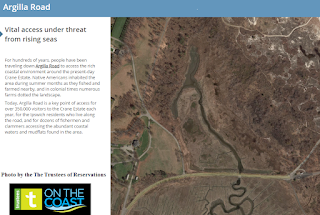Thursday, August 19, 2021
Baker-Polito Administration Invests $4 Million in Coastal Resilience Projects
Ipswich Building Climate Resilience through Adaptation at the Crane Estate: Development of Single Environmental Impact Report (SEIR) and Notice of Intent Application (NOI) for Argilla Road Adaptation, $75,642 The Town of Ipswich and The Trustees of Reservations will complete the SEIR, prepare and submit the NOI and renew the Order of Resource Area Delineation for the Argilla Road Adaptation project, which aims to elevate Argilla Road and build resilience using innovative nature-based designs to provide a storm-resilient transition to the adjacent wetlands and restore upland wetlands to full function through increased tidal exchange.
BOSTON – To help Massachusetts’ coastal communities prepare for severe weather events and the impacts of climate change, including storm surge, flooding, erosion and sea level rise, the Baker-Polito Administration announced the award of $4 million in grants to support local planning and management efforts. The funding, awarded by the Executive Office of Energy and Environmental Affairs’ (EEA) Office of Coastal Zone Management (CZM) Coastal Resilience Grant Program, will support projects in Braintree, Chatham, Dartmouth, Edgartown, Falmouth, Gosnold, Hingham, Hull, Ipswich, Marblehead, Marion, Mattapoisett, Orleans, Salem, Tisbury, Wareham, and the Woods Hole Oceanographic Institution.
“Climate change presents challenges for Massachusetts coastal communities, which face increasing storm damage and flooding risks during high tides and coastal storms,” said Governor Charlie Baker. “Our administration remains committed to providing necessary financial and technical support to proactively protect coastal infrastructure from these increasing threats, which is why we have proposed nearly $1 billion in funding for critical environmental initiatives like climate resilient infrastructure through our federal ARPA spending plan.”
“Through the Coastal Resilience Grants, municipal and nonprofit partners are able to reduce flooding and erosion impacts and provide environmental and recreational benefits along the state’s coastline,” said Lieutenant Governor Karyn Polito. “Importantly, this program creates a true collaboration with the state to address climate change impacts in innovative and effective ways.”
CZM’s Coastal Resilience Grant Program provides financial and technical assistance for local efforts to analyze vulnerabilities to climate impacts, increase community awareness and understanding of these issues, plan for changing conditions, redesign vulnerable community facilities and infrastructure, and restore shoreline systems. Grants may fund feasibility assessments, public outreach, design, permitting, construction, and monitoring of projects that enhance or create natural buffers to erosion and flooding.
Including the newly announced grants, the Baker-Polito Administration has now invested $23 million in 155 coastal resilience improvement projects through the Coastal Resilience Grant Program since 2015. Funding through the program has supported on-the-ground efforts including infrastructure retrofits and shoreline restoration projects to reduce wave energy, erosion, and flooding impacts.
“The Coastal Resilience Grant Program is a great example of the Baker-Polito Administration’s ongoing efforts to foster strong partnerships with municipalities and regional partners to maximize our resiliency investments,” said Energy and Environmental Affairs Secretary Kathleen Theoharides.“Identifying areas that are vulnerable to the impacts of climate change and implementing strong resilience measures is a top priority, which is reflected in the Administration’s proposal to invest ARPA funding in critical environmental and climate resilience initiatives.”

